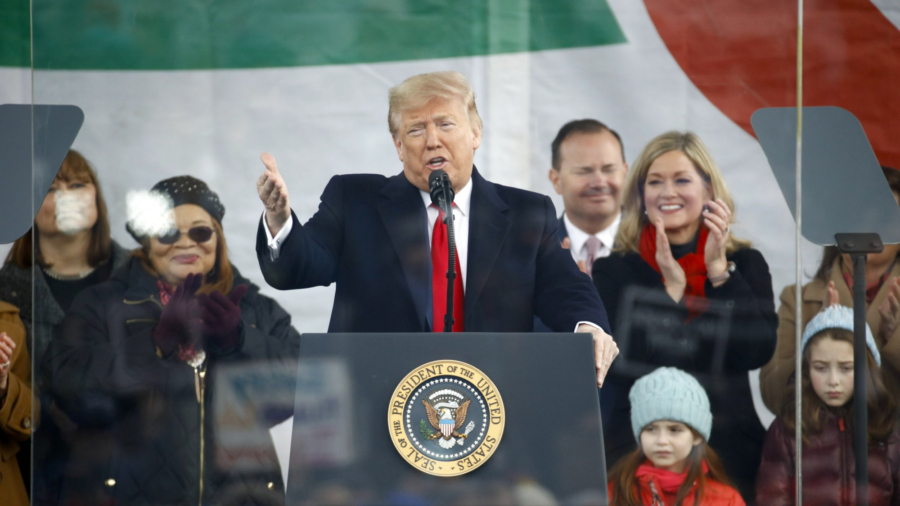WASHINGTON—President Donald Trump made a speech at the March for Life pro-life rally in Washington on Friday. He was the first president to do so.
The 13-minute speech focused on Trump’s support for the pro-life movement and the religious community more broadly. He also highlighted his administration’s actions in this regard, including cutting some federal funding to abortion providers.
“When we see the image of a baby in the womb we glimpse the majesty of God’s creation,” Trump said.
March for Life has been an annual rally since 1974, first held on the one-year anniversary of Roe vs. Wade, a Supreme Court decision that prevented states from imposing most previously existing restrictions on abortion. One of the goals of the rally has been to have the decision overturned.
Presidents Ronald Reagan, in 1987, and George W. Bush, in 2008, addressed the rally over the phone. Trump delivered a speech over satellite from the White House’s Rose Garden in 2018 and sent attendees a video message in 2019. This time, however, was the first time a president spoke in person.
“Unborn children have never had a stronger defender in the White House,” Trump said.

Among the measures Trump took against abortion was reinstating the Mexico City policy, which blocks foreign aid to non-governmental organizations that perform or promote abortion as a form of family planning. The policy was first put in place by Reagan but was nixed by Democratic presidents then reinstated by Republican ones.
Trump also had the Department of Health and Human Services reinterpret the rules for the Title X so that it “prohibits the use of Title X funds to perform, promote, refer for, or support abortion as a method of family planning” and requires “clear financial and physical separation between Title X and non-Title X activities.”
As a result, Planned Parenthood, the country’s largest abortion provider, stated it will no longer draw Title X funds, forgoing an estimated $60 million in annual taxpayer funding.
“We look forward to all of the blessings that will come from the beauty, talent, purpose, nobility, and grace of every American child,” Trump said in the last sentences addressing the crowd of tens of thousands on Capitol Hill.

Attendees
Katie Garcia, a college freshman, traveled to the rally from New Orleans.
“There’s nothing about abortion that’s ethical,” she said, explaining that she was only fully convinced to oppose abortion after attending the rally last year, especially after seeing images of aborted fetuses.

She said that many people came to the rally in support of Trump’s reelection, but said she and others she traveled with didn’t come for that purpose. “If that’s what brings people out here today, more power to them. That brings more people to raise awareness,” she said.
Jessy Suverino, a graduate student, came to the rally because of his belief “that the unborn deserve to have an opportunity to one day be born.”
“I’ve always believed that everybody deserves to be able to live,” he said.
“We here to protect the defenseless,” said Keiley Falcon, a middle schooler.

John Rocha, 48, a teacher from Arkansas, said he attended the rally to “celebrate life.” He said it was the birth of his first child that convinced him to oppose abortion.
As for Trump’s speech, he said “it’s great that a president, no matter who it is, what party, that he’s pro-life, that he would come out and support the whole movement.”

Kevin McCullouch, 22, is a seminarian at the Pontifical College Josephinum in Columbus, Ohio.
“I’m just here to support my belief that abortion should be illegal,” he said, noting that he’s Catholic and believes life begins at conception.
He called Trump’s attendance “super awesome” and “a good move for reelection.”
“It shows his care for this community and it shows his dedication,” he said.

Abortion in the US
Over 860,000 abortions were performed in the United States in 2017, according to the left-leaning Guttmacher Institute. About one in nine occurred in the second trimester or later.
The data is mostly based on voluntary survey of abortion providers known to the institute. Some numbers were also collected from state databases or estimated.
Roe vs. Wade and several subsequent cases stipulated that states can’t place restrictions on abortions conducted before the baby is considered “viable,” meaning the baby can survive outside the womb with medical support. Even after the baby is viable, a physician may perform abortion to avoid risk to the mother’s life or health, including mental health. Many states have de facto defied the decision, establishing more strict criteria. Some states have passed so-called “heartbeat bills” in recent years that prohibit abortions if a heartbeat can be detected, which is around the sixth week. At least some of the bills appear to be designed to get challenged in courts and have the Supreme Court pick up the issue.
A recent Marist poll (pdf) showed that 79 percent of Americans wanted restrictions on abortion beyond the framework allowed under Roe vs. Wade—26 percent wanted it banned expect for cases of rape, incest, or to save the life of the mother, 24 percent wanted it banned beyond the first trimester, 11 percent supported a ban except to save the life of the mother, 9 percent supported a ban beyond the second trimester, and another 9 percent supported an outright ban.
In addition, 65 percent of Americans said they were “likely to vote for a [presidential] candidate who wants significant restrictions” on abortion, including 44 percent of Democrats.
The poll was conducted in partnership with The Knights of Columbus, a global Catholic fraternal service organization.
A 2018 Gallup poll showed that 60 percent of Americans think abortion “should generally be legal” in the first trimester, while 28 percent said the same for the second trimester. When it comes to abortion elected for any reason, 45 percent said it should be legal in the first trimester.
Cynthia Cai contributed to this report.
From The Epoch Times


